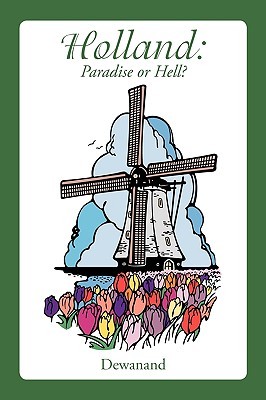Title: Holland: Paradise or Hell?
Author: Dewanand
Publisher: AuthorHouse
ISBN: 978-1449071363
Pages: 288, Paperback/Kindle
Genre: Travel
Reviewed by: Jamal Ibrahim, Ph.D. for Pacific Book Review
Book Reivew
What we have in Holland: Paradise or Hell? is a succession of scores of terse analytical essays dealing with most every observable aspect of Dutch culture, as seen by the articulate Indian author Dewanand. By choosing the subtitle “Paradise or Hell,” he firsts suggests that both aspects of the culture exists, and it is the view of the individual to determine the acceptance or frustration of his or her existence which shall warrant the definition of being a heaven or hell. Although trying ardently to maintain an objective, even keeled and scientific narration, it is clearly perceived by the reader through the author’s comments his Hindu and conservative beliefs are in a way mocking the odd and financially absurd ways the culture in Holland has evolved.This is immediately brought to the reader’s attention from the onset, describing the gay culture; how Dutch citizens are fundamentally liberal in the allowances homosexuality, sodemy, lesbian behavior and even beasteology. The author professes human work values are at the core of being morphed into acceptance from the “cradle-to-grave state care” given by the welfare state, diminishing the intrinsic human quest for succeeding largely because of the structured diminishing returns of self-achievement.
Although clearly admiring the team effort of the white, aristocratic class of the Dutch, whereas a group 14 million has amassed such wealth and status in the world thorough history, the subsets of welfare dependants, unmotivated or handicapped, drug addicts, sexual deviants and even the Surinamese and those of their decent have undermined the culture to the brink of implosion. However, just like the dams and levees keep the ocean out, so does the balance achieved with the governments managing the financial aspects of governing, leading to a peaceful, secure status-quo which has manifested itself a successful society. It is this balance in which Dewanand writes about, offering at many times the pro’s and con’s of the situation, with his personal view at the end always pointing to his belief, which comprises the literary pace of the book.
The genre of the book is hard to pin-point, as it is not a research book due to a lack of footnotes or credit given to other literature. It reads somewhat like a travel guide, offering a street level view of the Dutch people and culture for those planning a visit, however with the depth of opinionated projections as to subject matter again steps away from the travel genre. Dewanand takes a moral high road with his comments, being careful not to be politically incorrect or offensive.
All in all this book is a fast read, interlaced with unique observations and sober analysis of trends and factors which have made the Dutch such a fascinating and powerful culture. Although a bit controversial with a spiraling down to sexual undercurrents of the motivation of individuals accepted within Holland’s culture, Dewanand has kept the writing exempt from any profanity and vulgarity, offering a perspective or view to the reader in a way most would not know about unless having traveled to the area or from reading countless other literary works on the topic.
Dewanand being a resident of Holland has written his book in a way of being a foreigner in a strange land, explaining this to his counterparts elsewhere in the world. He is by no means holding back his opinions, and strong and forceful in his unambiguous beliefs, not shying away from any controversy which may develop from his words. The book is a bold and although an opinionated journal, one with chronicling the state’s philosophies to a point in time, called the “present.”


